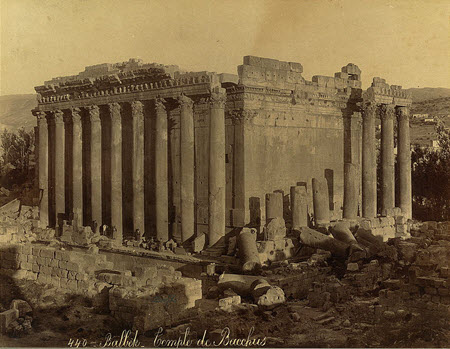
The victory of Constantine the Great over his rival to the throne of Rome,
led to Christianity becoming the state religion of the Empire.

The vast empire of the Romans brought them into contact with many different peoples and belief systems. Initially the Romans had their own indigenous religion, but it came to be heavily influenced by Greek beliefs and philosophy. Eastern Mystery Religions including the cult of Isis from Egypt also became extremely popular in Rome.
Although pagan Rome had its tutelary deities and religious practices which were believed to be essential to the welfare and success of the Empire, the Empire was relatively tolerant of the worship of other gods. Within a polytheistic system, there was always room for more gods, even if some of them were Emperors-turned-gods. As long as proper devotion was given to the gods and temples favored by the Roman state, the Roman emperors and state security apparatus did not concern itself too much with private beliefs.
The Roman wars against the Jews and in particular the suppression of the Jewish revolt brought Rome into conflict with the monotheistic religion of the Old Testament, but even then the conflict between Rome and the Jews was mainly political. As long as they obeyed Roman over lordship, the Romans did not particularly care about their beliefs, through from the pagan, Roman perspective, they were not orthodox. In fact, there were large Jewish populations in Rome and other major Roman cities.
This attitude of tolerance towards religious belief, despite the autocratic nature of the Roman state, changed when Christianity began to make inroads. Unlike Judaism, Christianity actively sought to convert the entire population. So, whale the Romans could tolerate unorthodox beliefs when they were restricted to a small racial minority, they became deeply concerned when their soldiers, their relatives, their servants became converted to this new religion of Christianity, a religion which did not tolerate the old gods but actively denounced them and all that they stood for as agents of the devil.
The Roman reaction was brutal. Christians were tortured and publicly executed in the most barbaric ways. They provided entertainment to the masses by being eaten alive by wild beasts and otherwise destroyed. Ironically, the Christians' willingness to die for their faith, often very bravely, ended up winning them new converts. Stories of miracles worked by the martyred Christians also resulted in many converts and more and more people abandoned the old religion.
Christianity scored a signal success when the Emperor Constantine the Great made it the empire's official state religion, even though he was probably not devout himself. His reasons were many, including the need to unify the empire's diverse people under a single religion.
This book traces the transformation of Rome, the center of the Empire, from a pagan city to the capital of Christianity.
